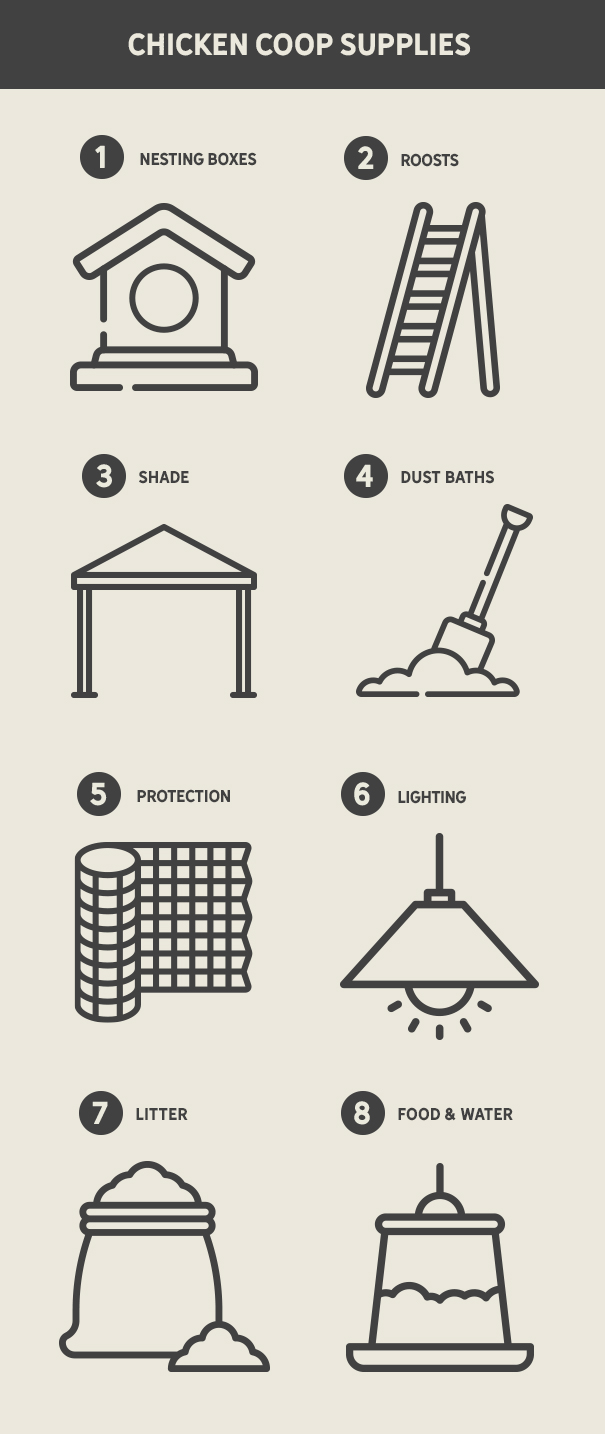

What You Need for Your Backyard Chicken Coop
If you’re looking to add a backyard chicken coop with a few chickens for some farm fresh eggs, make sure your hens have everything they need to set them up for success. You might know that they will need nesting boxes and a place to sleep, but did you know chickens also take dust baths? Before you grow your flock, make sure you first have your ducks (or chickens!) in a row.
The Coop
Rasing chickens starts with a coop. It should be comfortable, clean, and safe. Most backyard chicken coops are made of lumber (like pressure treated pine) and include an enclosed space with a door for chickens to lay their eggs and a little yard or chicken run that has been fenced off. If you do not already have a coop, check out these plans.


8 Supplies Chickens Need
After you have gotten your coop built, it’s time to make it homey for your flock.
- Nesting Boxes-If you haven’t already built them, your chickens will need nesting boxes to lay their eggs. A good rule of thumb is one square foot of nesting space per hen. A space too large could encourage a hen to be “broody” where they want to sit on their eggs to hatch, which is not ideal if you want to collect the eggs. If possible, these boxes should be placed in darker, secluded places as that is where chickens like to lay.
Even though they are called nesting boxes, they don’t have to be box shaped. As long as your chickens feel safe and cozy, a nesting box can be made from anything. Even a yellow bucket! Inside the nesting box, there should be a comfortable layer of straw or hay.
- Roosts- Chickens like to perch. Roosts provide your chickens with the space to perch and sleep. There should be between eight and ten inches of roosting space per chicken and should be at least two feet off the ground. The perch space should be wide enough for your chickens to grab hold of and sleep with their feet under them. A short, wood ladder made from 2x4s is a quick DIY that will give your chickens a good amount of roosting space. Or a simple shower rod will do that you have anchored to the coop.
- Shade- Especially in the summer, providing ample shade is important in helping your chickens keep cool. Chickens can regulate their body temperature pretty well, but having good air movement in the coop and large trees or even the side of a barn or house where they get some shade will help them during the hottest part of the day. A large tarp can also be secured to the top of your chicken coop area. In the hottest months, wetting the ground will give them a cool spot to lay in.
- Dust Baths- Chickens take baths, but they do it with dust. While this may sound counter-intuitive, dust baths help prevent parasites. If you don’t have a dirt floor in your coop, you can build them a dust bath area with a small swimming pool or a feeder pan filled with clean dirt. Including some diatomaceous earth in with the dirt can add even more parasite protection.
- Protection- The best way to protect against predators is to know what kind you have in your area and how they hunt- dogs, raccoons, foxes, and hawks are all common chicken predators. Along the open gaps of your chicken coop and run, you will need to fence in the area with a hardware cloth-- including the top. For added security, the fencing can be buried at least a foot into the ground to discourage digging by a predator. Even if you have a moveable coop, a top cover will help keep your chickens safe from flying predators.
- Lighting- While chicken coops themselves don’t need lighting, adding a brooder’s lamp in the winter will help keep your chickens warm. A brooder’s lamp is an aluminum heat lamp that can be installed inside the coop. A red heat lamp lightbulb must be used with this to help prevent pecking. Make sure the heat lamp is hung securely and away from any flammable material to avoid setting fire to the coop.
- Litter- Having litter trays inside your coop under roosting spaces or as flooring can help keep a coop clean. Pine shavings are best for chicken coop litter as it is absorbent and easy to clean out with a bedding fork.
- Food and Water- One of the most important things you can do for your chickens is to make sure they have fresh water every day. Poultry waterers come with large capacities to keep your chicken hydrated. Poultry feeders must be kept inside the coop to keep away hungry critters, pests, or predators.
Aside from chicken feed, chicken scratch is a treat often given to chickens. It is made with corn, seeds, and sometimes even worms. To help digest their food, chickens need grit. Grit is tiny, ground rocks that help them to break up their food. If their feed does not include grit, make sure to supplement with it. If you have young chicks during the summer, supplementing their water with electrolytes will help keep them hydrated.
We could make a "why did the chicken cross the road" joke here, but we know your chickens will be safe and sound in their coop. Ready to get started? Head over to your local McCoy's for all things chicken from the coop to protection to feeding. You supply the chicks.

